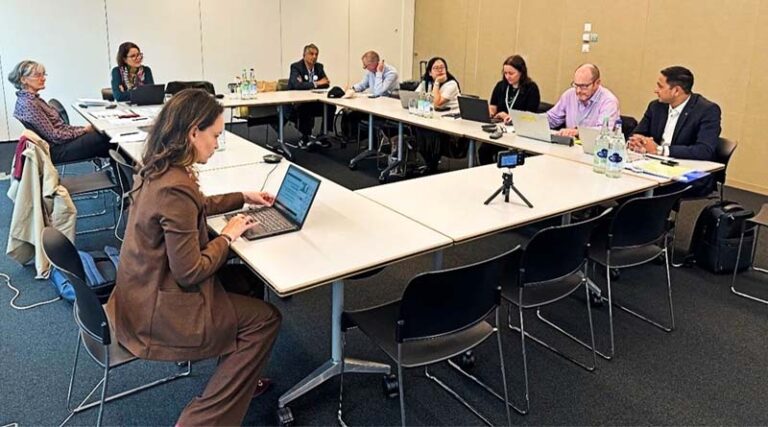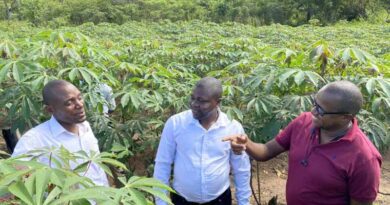
Strengthening collaboration on policy and enforcement: Highlights from FARM workshop at Annual Biocontrol Industry Meeting 2025
01 November 2025, Ghana: Component 1 of the FARM Global Child Project focuses on strengthening policy and enforcement frameworks related to pesticide management and agri-plastics, on creating an enabling environment for promoting the production, licensing and use of bio-control systems such as biopesticides; and supporting the phase out and environmentally sustainable end of life management of HHPs such as persistent organic pollutants (POPs) and agri-plastics. It also seeks to strengthen enforcement of regulations and restrictions on pesticides and agri-plastics.
The intended purpose of agricultural inputs such as pesticides and agri-plastics is to contribute to productivity and/or crop quality, but they can also have significant negative impacts e.g. on ecosystem services such as soil health and pollination as well as on human health and the environment.
As a group, HHPs are the most problematic pesticides as they are “acknowledged to present particularly high levels of acute or chronic hazards to health or the environment according to internationally accepted classification systems” or “appear to cause severe or irreversible harm to health or the environment under the conditions of use in a country”.
The international community has recognized HHPs as a particularly significant issue and has called for concerted action to address them. Meanwhile, in many countries, existing regulatory frameworks impede access to lower risk plant protection products.
For example, the registration process for biopesticides is often identical to that of conventional chemical pesticides, imposing an unnecessarily high and inappropriate regulatory burden. Another barrier to pesticide risk reduction is inadequate implementation of regulations, leading to weak control and enforcement systems.
An engaging, participatory format
Facilitated by Dr Robert Malek, Dr Anna Wood, and Dr Melanie Bateman from CABI, with Dr Sheila Willis and Alex Stuart from PAN-UK, the 90-minute hybrid session combined interactive polling via Mentimeter with group discussions and stakeholder mapping exercises.
Participants worked together to:
Review and refine preliminary findings from the scoping study
Identify missing or over-emphasized knowledge gaps
Map key national and regional stakeholders engaged in pesticide management
Share success stories and promising practices that could be scaled or adapted across countries.
The hybrid format created an inclusive and collaborative atmosphere—linking in-person participants in Basel with online colleagues worldwide.
Emerging Insights and Shared Priorities
Mentimeter polls revealed rich and diverse perspectives across projects. Participants highlighted the need for:
Greater technical support and tools to phase out HHPs
Enhanced monitoring and enforcement capacity for persistent organic pollutants and pesticide regulations
Expanded access to and understanding of biopesticides and other low-risk alternatives
Improved systems for data collection, including gender-disaggregated information at farm level.
In group work, participants identified key stakeholders across government, research, private sector, and civil society who could play pivotal roles in strengthening policy implementation.
Sharing Successes Across the FARM Network
Rather than focusing on traditional “success stories,” participants shared how their projects have faced and overcome real implementation challenges.
From India, colleagues shared how the project’s initial activities could only move forward once a clear and inclusive stakeholder engagement strategy was in place. By taking time to identify and involve the right actors, from government departments to research institutions and civil society, the team was able to build trust, align priorities, and create the enabling conditions for progress.
In Kenya, the establishment of two technical working groups, one dedicated to agri-plastics and another to pesticides, proved instrumental in setting the pace and direction of project activities. These groups provided structured platforms for collaboration, allowing stakeholders to identify national needs, define shared goals, and ensure that external interventions were aligned with domestic priorities.
These stories underscored the importance of peer learning and cross-country exchange within the FARM network.
📢 If You’re in Agriculture, Make Sure the Right People Hear Your Story.
From product launches to strategic announcements, Global Agriculture offers unmatched visibility across international agri-business markets. Connect with us at pr@global-agriculture.com to explore editorial and advertising opportunities that reach the right audience, worldwide.






